JavaScript is required.
- Old Version |
- Collins Dictionary |
- Google Dictionary |
- IELTS Lessons|
- Practice tests|
- English exams|
- Document image tool
A completely new type of dictionary with word collocation that helps students and advanced learners effectively study, write and speak natural-sounding English . This online dictionary is very helpful for the education of the IELTS, TOEFL test.
- Collocations/collocation - common word combinations such as 'bright idea' or 'talk freely' - are the essential building blocks of natural-sounding English. The dictionary contains over 150,000 collocations for nearly 9,000 headwords.
- The dictionary shows words commonly used in combination with each headword: nouns, verbs, adjectives, adverbs, and prepositions, common phrases.
- The collocation dictionary is based on 100 million word British National Corpus.
- Over 50,000 examples show how the collocation/collocations are used in context, with grammar and register information where helpful.
- The clear page layout groups collocations according to part of speech and meaning, and helps users pinpoint speedily the headword, sense and collocation they need.
- Free Download -- OXFORD Collocations Dictionary
- Document image tool -- Free photo repair|Free document conversion|More
- Google Dictionary
- Wordnet Online
- English Test Info
- IELTS English Test
- Collins Dictionary
- IELTS Lessons
- Practice tests
- English exams
This site is supported by Send me an email .


Collocations With "VISIT" in English
- Collocation Dictionary
- VISIT collocations
visit noun ADJ. brief, fleeting, flying, quick, short | lengthy, long | eight-day, hour-long, etc. | long-awaited | regular | constant, frequent She enjoyed the frequent visits of her grandchildren. | infrequent, annual, daily, twice-weekly, etc. | forthcoming, impending occasional, periodic, rare | The prime minister has been briefed in preparation for his forthcoming visit to China. | exchange, reciprocal, return Exchange visits between company and school have kept the project going. They came to visit last week, and we'll pay them a return visit in the autumn. | surprise, unannounced, unexpected | unwelcome | casual | formal, ministerial, official, presidential, royal, state | high-profile | trade | private, unofficial | foreign, overseas | personal Following her letter of complaint, she received a personal visit from the store manager. | domiciliary, home You should receive a home visit from your midwife within a month. | hospital, prison | initial, preliminary | follow-up | social | neighbourly | educational, study | fact-finding, research | courtesy, goodwill While on holiday in Italy, the prime minister paid a courtesy visit to his opposite number in Rome. | morale-boosting | inspection, monitoring | on-site, site | school | customer | memorable VERB + VISIT go on, make, pay sb, undertake We used to go on school visits to museums and historical buildings. How many doctors are still able to make home visits? Pay us a visit next time you're in town. | get, have, receive | look forward to I'd been looking forward to my cousin's visit for ages. | arrange, organize | postpone | cancel | cut short He was forced to cut short a visit to North America. | prolong He offered her a drink to try to prolong her visit. | announce We received a letter announcing a visit from government inspectors. | be (well) worth If you're staying in Rome, Ostia is well worth a visit. VISIT + VERB mark sth, signal sth The visit signalled the normalization of relations between the two countries. PREP. during/on a/the ~ On one of her regular visits home, she told her parents she was engaged. | ~ from We had a visit from somebody collecting for charity. | ~ to a visit to the theatre
visit verb ADV. regularly VERB + VISIT come to, go to My parents are coming to visit me next week. We've just been to visit my grandparents. | decide to, hope to, intend to, plan to, promise to, want to, wish to | be expected to, be likely to A million people are expected to visit the museum over the next 12 months. | invite sb to, urge sb to

What is a collocation?
A collocation is two or more words that often go together. These combinations (for example collocations with “VISIT” ) just sound “right” to native English speakers, who use them all the time. On the other hand, other combinations of “VISIT” may be unnatural and just sound “wrong”.
Using collocations list of “VISIT” improves your English, especially your English speaking skills, and increases your vocabulary words in English.
Why learn collocations with “VISIT” ?
- When using collocations with “VISIT” , Your language will be more natural and more easily understood.
- You will have alternative and richer ways of expressing yourself.
- It is easier for our brains to remember and use language in chunks or blocks such as Common Collocations with “VISIT” rather than as single words ( VISIT | Translation, Meaning in Persian (Farsi) )
How to learn collocations with “VISIT” ?
- Be aware of collocations with VISIT , and try to recognize them when you see or hear them.
- Treat collocations as single blocks of language. Think of them as individual blocks or chunks, and learn strongly support, not strongly + support.
- When you learn a new word ( e.g. VISIT | Translation, Meaning in Persian (Farsi) ), write down other words that collocate with it.
- Read as much as possible. Reading is an excellent way to learn vocabulary and collocations of “VISIT” in context and naturally.
- Revise what you learn regularly. Practice using new collocations with “VISIT” in context as soon as possible after learning them.
- Learn collocations with “ VISIT ” in groups that work for you. You could learn them by topic (time, number, weather, money, family) or by a particular word (take action, take a chance, take an exam).
Types of collocation with “VISIT”
- adverb + adjective: completely satisfied (NOT downright satisfied)
- adjective + noun: excruciating pain (NOT excruciating joy)
- noun + noun: a surge of anger (NOT a rush of anger)
- noun + verb: lions roar (NOT lions shout)
- verb + noun: commit suicide (NOT undertake suicide)
- verb + expression with preposition: burst into tears (NOT blow up in tears)
- verb + adverb: wave frantically (NOT wave feverishly)
Using Collocations of VISIT to Boost Your IELTS Score
The correct use of collocations of “VISIT” is an essential part of improving your English level and boosting your IELTS score. Using collocations + “VISIT” in sentence examples correctly allows you to write and speak more like a native speaker and they are also one of the things that examiners look out for when marking your tests.
VISIT Collocation Frequently Asked Questions
Why are VISIT collocations important? VISIT collocations are important because they make your language sound natural. If you master VISIT collocations, your English will be more idiomatic, that is, more similar to the way it is spoken by native speakers. It is acknowledged that knowledge of VISIT collocations helps to improve learners' language skills, enhance learners' communicative competence, and achieve native-like fluency.
- What is the importance of learning "VISIT" collocation?
- what is the purpose of "visit" collocation, - why is "visit" collocation important in the language teaching and learning, - what are the features of collocations, - what is "visit" collocation, - why learn "visit" collocations, - how to learn "visit" collocations.
- Collocation
- the word which collocates with VISIT is
- VISIT collocative word
- collocation word VISIT examples
- VISIT collocation
- collocative word for VISIT
- the word that collocates with VISIT is
- VISIT collective words
- collocative word of VISIT
- collocations with VISIT
- 50000 in words
- 15000 in words
- 20000 in words
- 40000 in words
- 25000 in words
- 10000 in words
- such as in a sentence
- likewise in a sentence
- moreover in a sentence
- apathy in a sentence
- whereas in a sentence
- nostalgia in a sentence

Oxford dictionary
A completely new type of dictionary with word collocation that helps students and advanced learners effectively study, write and speak natural-sounding English. This online dictionary is very helpful for the education of the IELTS, TOEFL test.
Level:Upper-Intermediate to Advanced
Key features:of oxford dictionary online.
- Collocations/collocation - common word combinations such as 'bright idea' or 'talk freely' - are the essential building blocks of natural-sounding English. The dictionary contains over 150,000 collocations for nearly 9,000 headwords.
- The dictionary shows words commonly used in combination with each headword: nouns, verbs, adjectives, adverbs, and prepositions, common phrases.
- The collocation dictionary is based on 100 million word British National Corpus.
- Over 50,000 examples show how the collocation/collocations are used in context, with grammar and register information where helpful.
- The clear page layout groups collocations according to part of speech and meaning, and helps users pinpoint speedily the headword, sense and collocation they need.
- Excellent communication skills, most notably a demonstrated ability to solicit and address creative and design feedback

Online OXFORD Collocation Dictionary of English
Document Tool
- word to pdf
- Html to pdf
- Document translation
Picture Tool
- Old photos, damaged photos repair
- Old photos, black and white photos become color
- Photo to cartoon image
- AI image lossless enlargement
English learning
- TOEFL learning
- English test
- SAT.GAE.GAMT learning
Copyright © 2019 Oxford dictionary All Rights Reserved.
Collocations
Find typical usage patterns (collocations) for English words. Enter a verb, a noun or an adjective.
Try these words
Some more examples with collocations.
- heavy smoker
- inveterate smoker
- lifelong smoker
- habitual smoker
- to smoke pipe
- to smoke cigarette
- to smoke marijuana
- to smoke cigar
- coffee shop
- repair shop
- barber shop
- memory fade s
- memory fail s
- memory serve s
- memory remain s
- to throw the light
- to see the light
- to shed the light
- to reflect the light
- Dictionaries home
- American English
- Collocations
- German-English
- Grammar home
- Practical English Usage
- Learn & Practise Grammar (Beta)
- Word Lists home
- My Word Lists
- Recent additions
- Resources home
- Text Checker
Definition of visit noun from the Oxford Advanced Learner's Dictionary
- a two-day/three-day visit
- the prime minister's surprise visit to the troops
- an official/state visit
- visit to somebody/something It's my first visit to New York.
- If you have time, pay a visit to the local museum.
- The family made a visit to England in the summer of 1923.
- a visit to the doctor
- His visits home were limited to Christmas.
- visit from somebody We had a visit from the police last night.
- visit by somebody Arranegments are being made for a visit by a member of the royal family.
- (British English) a home visit (= when your doctor visits you)
- a brief/recent visit
- on/during a visit The team reported on deficiencies found during the site visit .
- Regular visits to the dentist are important.
- Is this a social visit, or is it business?
- They're on an exchange visit to France.
- Following this initial visit, she will return to Montserrat in June.
- Following her letter of complaint, she received a personal visit from the store manager.
- He offered her a drink to try to prolong her visit.
- He was forced to cut short a visit to North America.
- How many doctors are still able to make home visits?
- I think it's time we paid him a little visit.
- I'd been looking forward to my cousin's visit for ages.
- If you're staying in Rome, Ostia is well worth a visit.
- On one of her regular visits home, she told her parents she was engaged.
- Pay us a visit next time you're in town.
- She enjoyed the frequent visits of her grandchildren.
- The President has been briefed in preparation for his forthcoming visit to Russia.
- The visit signalled the normalization of relations between the two countries.
- We had a visit from somebody collecting for charity.
- We received a letter announcing a visit from government inspectors.
- We used to go on school visits to museums and historical buildings.
- While on holiday in Italy, the prime minister paid a courtesy visit to his opposite number in Rome.
- You should receive a home visit from your midwife within a month.
- a visit to the dentist
- Allow three hours for your visit.
- Enjoy your visit!
- Is this a social visit or are you here on business?
- Is this your first visit to New York?
- She was making one of her frequent visits to London.
- The inspectors paid a surprise visit to the factory.
- The prime minister is on an official visit to Jamaica.
- They received a visit from the party leader.
- We had to cut short our visit and fly home.
- during a/the visit
- on a/the visit
Join our community to access the latest language learning and assessment tips from Oxford University Press!
- visit to something Visits to our website have doubled in a year.
- The site now gets about 600,000 visits a day.
- He thought back to his visit with the doctor.
Other results
- courtesy visit
- visit with somebody
- visit something on somebody/something
- visit something upon somebody/something
Nearby words
- VisitBritain
pay a visit
collocation pattern: verb + noun
to visit someone or something
For example
- You should pay your lawyer a visit and get some advice.
- If you have time, pay a visit to the science museum while you're here.
Paying a visit to someone always
Contributor: Matt Errey

paper-free learning
- conjunctions
- determiners
- interjections
- prepositions
- affect vs effect
- its vs it's
- your vs you're
- which vs that
- who vs whom
- who's vs whose
- averse vs adverse
- 250+ more...
- apostrophes
- quotation marks
- lots more...
- common writing errors
- FAQs by writers
- awkward plurals
- ESL vocabulary lists
- all our grammar videos
- idioms and proverbs
- Latin terms
- collective nouns for animals
- tattoo fails
- vocabulary categories
- most common verbs
- top 10 irregular verbs
- top 10 regular verbs
- top 10 spelling rules
- improve spelling
- common misspellings
- role-play scenarios
- favo(u)rite word lists
- multiple-choice test
- Tetris game
- grammar-themed memory game
- 100s more...

Collocation
What is a collocation.
Table of Contents
Examples of Collocation
Types of collocation, why understanding collocation is important.

Have, Take, and Make
- have a baby, have breakfast, have fun, have a headache, have an illness, have a good time
- take advice, take a bath, take medicine, take a picture, take a shower, take your time
- make breakfast, make a cake, make a mistake, make some tea, make a wish
- If you want to sound like a native speaker, you must recognize and learn the collocations.

This page was written by Craig Shrives .
Learning Resources
more actions:
This test is printable and sendable
Help Us Improve Grammar Monster
- Do you disagree with something on this page?
- Did you spot a typo?
Find Us Quicker!
- When using a search engine (e.g., Google, Bing), you will find Grammar Monster quicker if you add #gm to your search term.
You might also like...
Share This Page

If you like Grammar Monster (or this page in particular), please link to it or share it with others. If you do, please tell us . It helps us a lot!
Create a QR Code

Use our handy widget to create a QR code for this page...or any page.
< previous lesson
next lesson >

Verb Collocations: Most Popular Verb Collocations in English
Verb Collocations! In the English language, collocation refers to a natural combination of words that are closely affiliated with each other. Some examples of verb collocations are “pay attention”, “fast food”, “make an effort”, and “powerful engine”.
Table of Contents
Verb Collocations
Below is a list of verbs collocations in English with examples.
Collocations with GO
E.g. I think we should go abroad on holiday this year.
E.g. John will go astray if he becomes friends with Bad Jack.
E.g. The milk will go bad if it is not kept in the fridge.
E.g. Many men go bald at an early age.
- Go bankrupt
E.g. The company is about to go bankrupt .
E.g. The old cat is starting to go blind .
E.g. The old man is going to go crazy .
E.g. Many old people go deaf .
E.g. I would like to go fishing this weekend.
- Go insane ( idiom )
E.g. If you don’t stop making that noise, I’m going to go (completely) insane !…
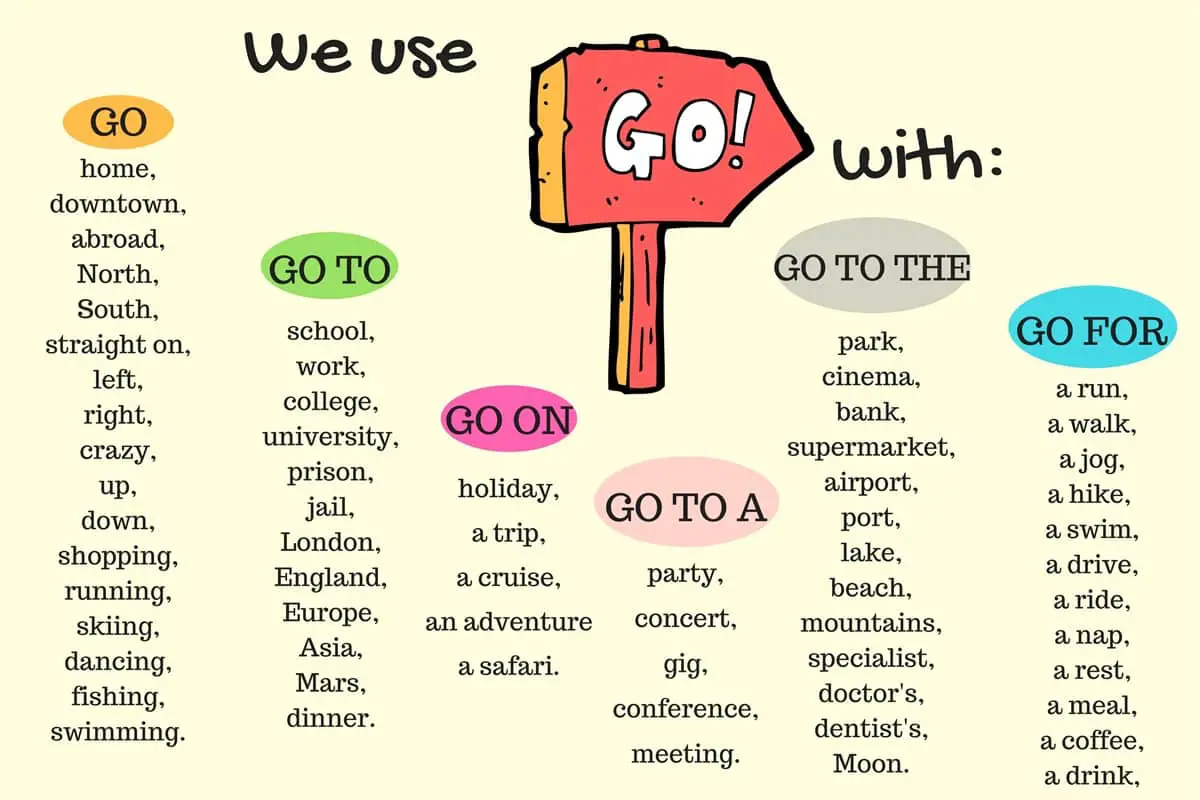
Collocations with HAVE
- A baby (To give birth to a baby)
My grandmother had all her babies at home.
My father has a backache so he couldn’t sleep well.
I can’t remember the last time I had a bath
Can I have a bite of your hot dog?
Let’s have a break when you finish this exercise
- A business trip
My dad has a business trip so we could not visit our grandmother together
I have a busy day.
- A conversation/chat
Can we have a conversation before we make any decision?
- A cup of tea/ coffee
Would you like to have a cup of tea/coffee
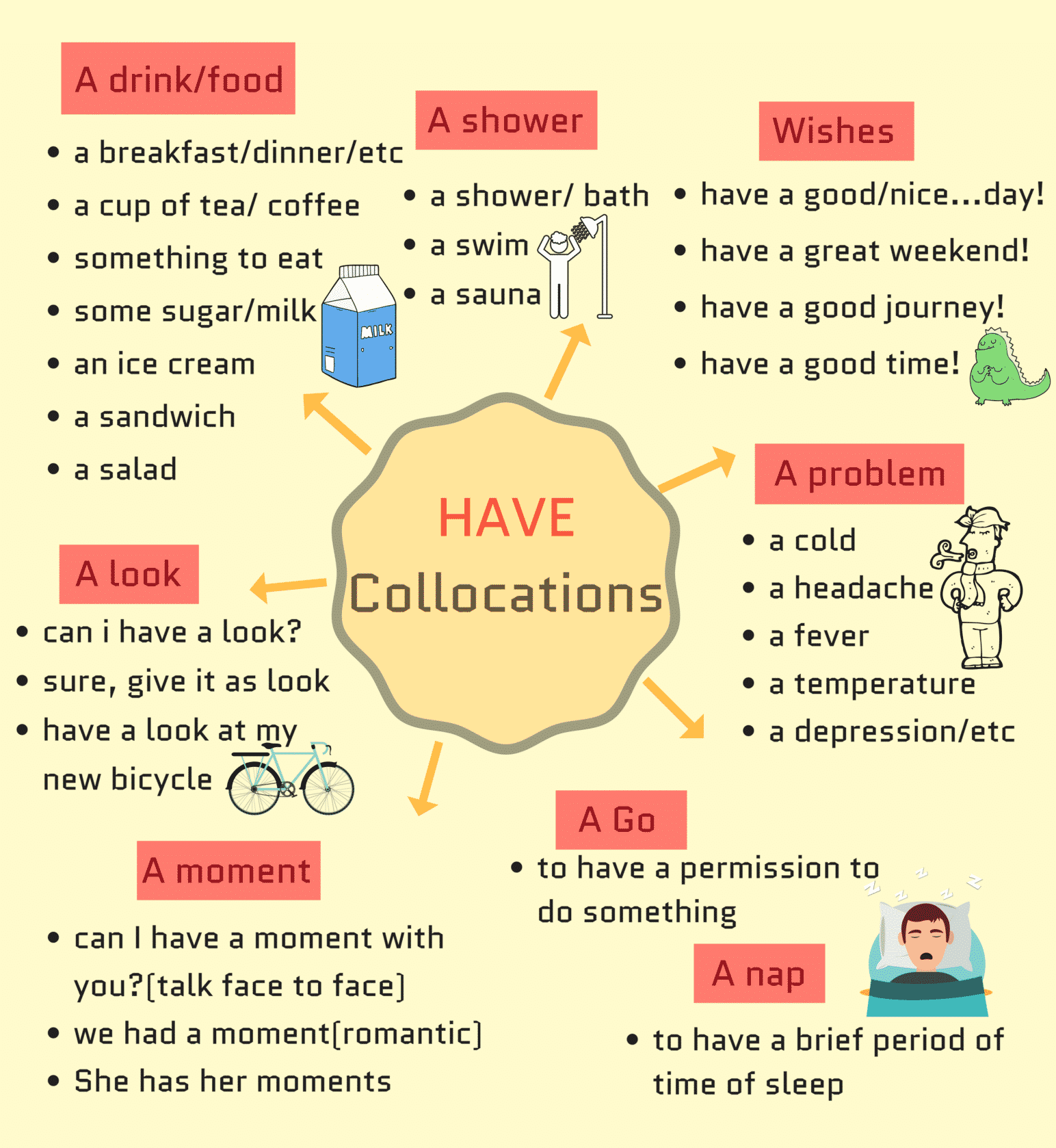
Collocations with MAKE
- Make a mess
Eg: If rich kids make a mess, their servants tidy things up again.
- Make a mistake
Eg: Whenever we make mistakes, our teacher corrects them for us.
- Make a note (of)
Eg: I’d better make a note of that, or I might forget.
- Make a reservation
Eg: Shall I make a reservation for 8 o’clock at that Japanese restaurant?
- Make a takeover bid
Eg: The company made a takeover bid for one of its rivals.
- Make an appearance
Eg: We waited forthirty minutes for the professor to make an appearance,then we went home.
- Make an effort
Eg: You can’t learn a language without making an effort…
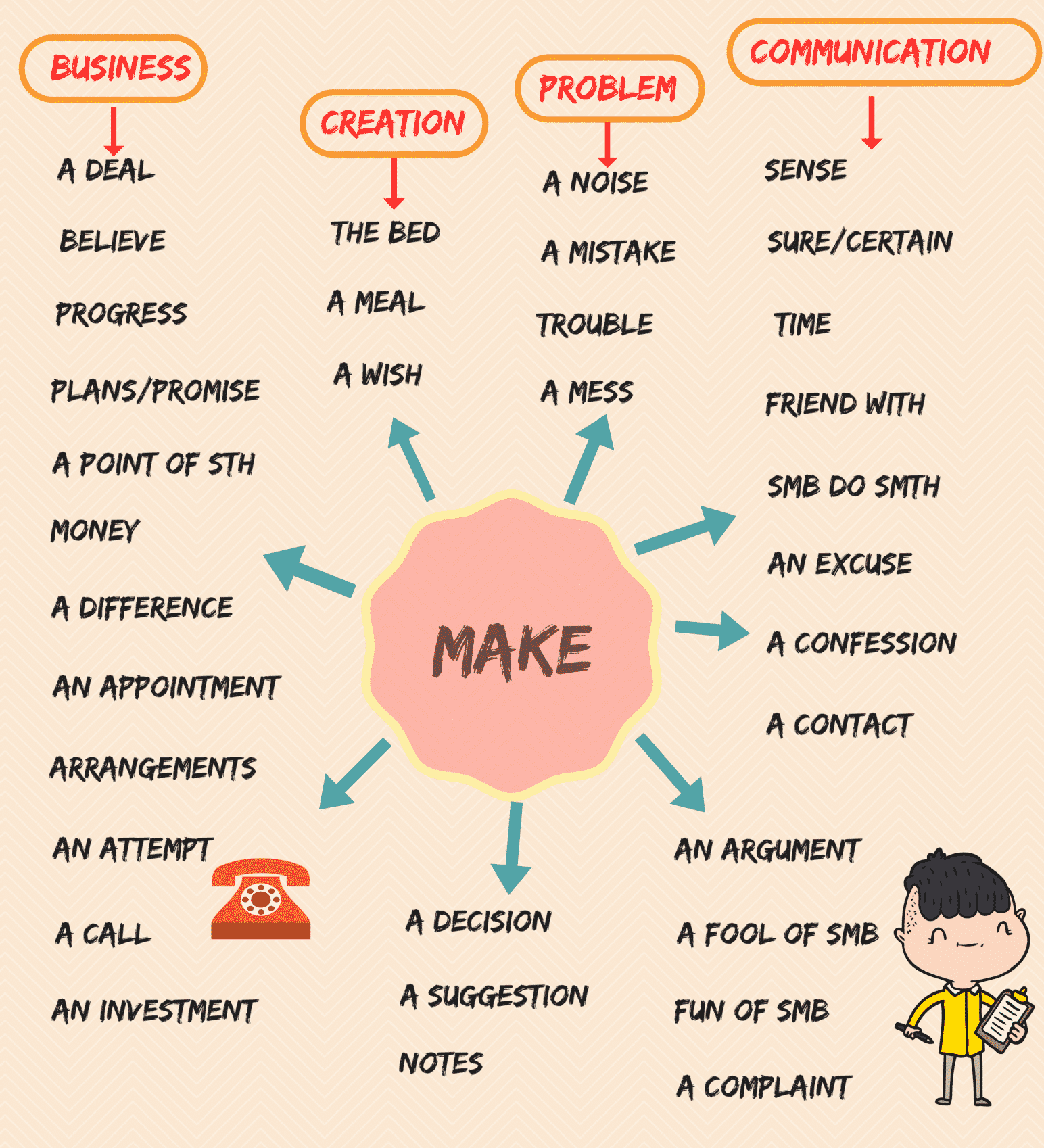
Collocations with “GIVE”
- A call (a ring, a buzz)
E.g. Give me a call when you get back from your trip.
E.g. He gave me a chance and I took it gladly.
E.g. I was given no choice; I had to go to the boring lecture.
E.g. She doesn’t give a damn about her job.
E.g. Can I give you a hand with those bags?
E.g. That loud music is giving me a headache.
- A hug or kiss
E.g. Come here and give me a kiss!
- A lecture or speech or performance
E.g. The president will give a long speech…
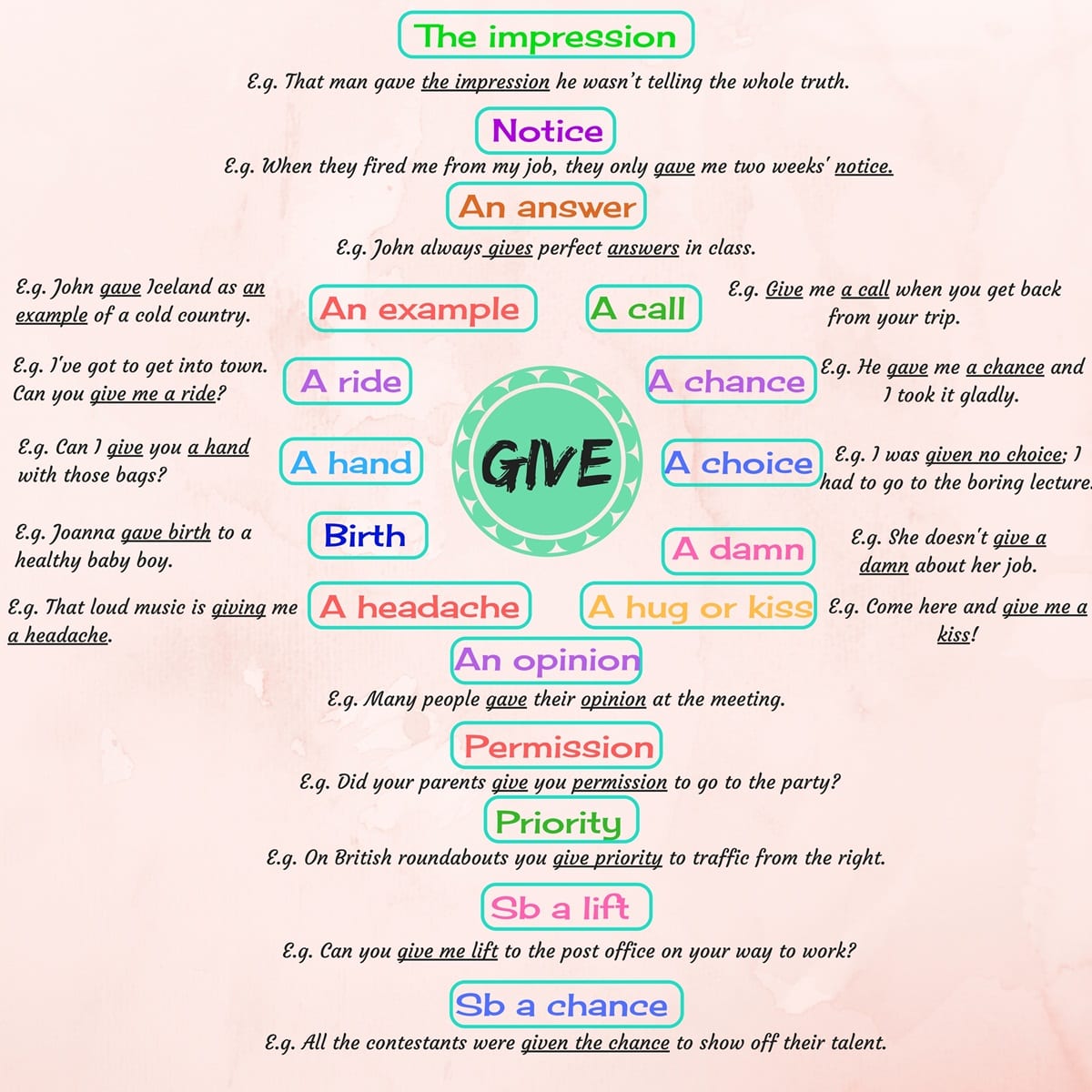
Collocations with DO
E.g. We’re doing a course at the local university.
E.g. Have you done any deals with distributors in Asia yet?
E.g. Can you do me a favour?
- A good/great/terrible job
E.g. You’ve done a good job cleaning the house!
E.g. I’m doing a report on the history of American foreign policy.
E.g. Everyone did badly on the test – the highest grade was 68…
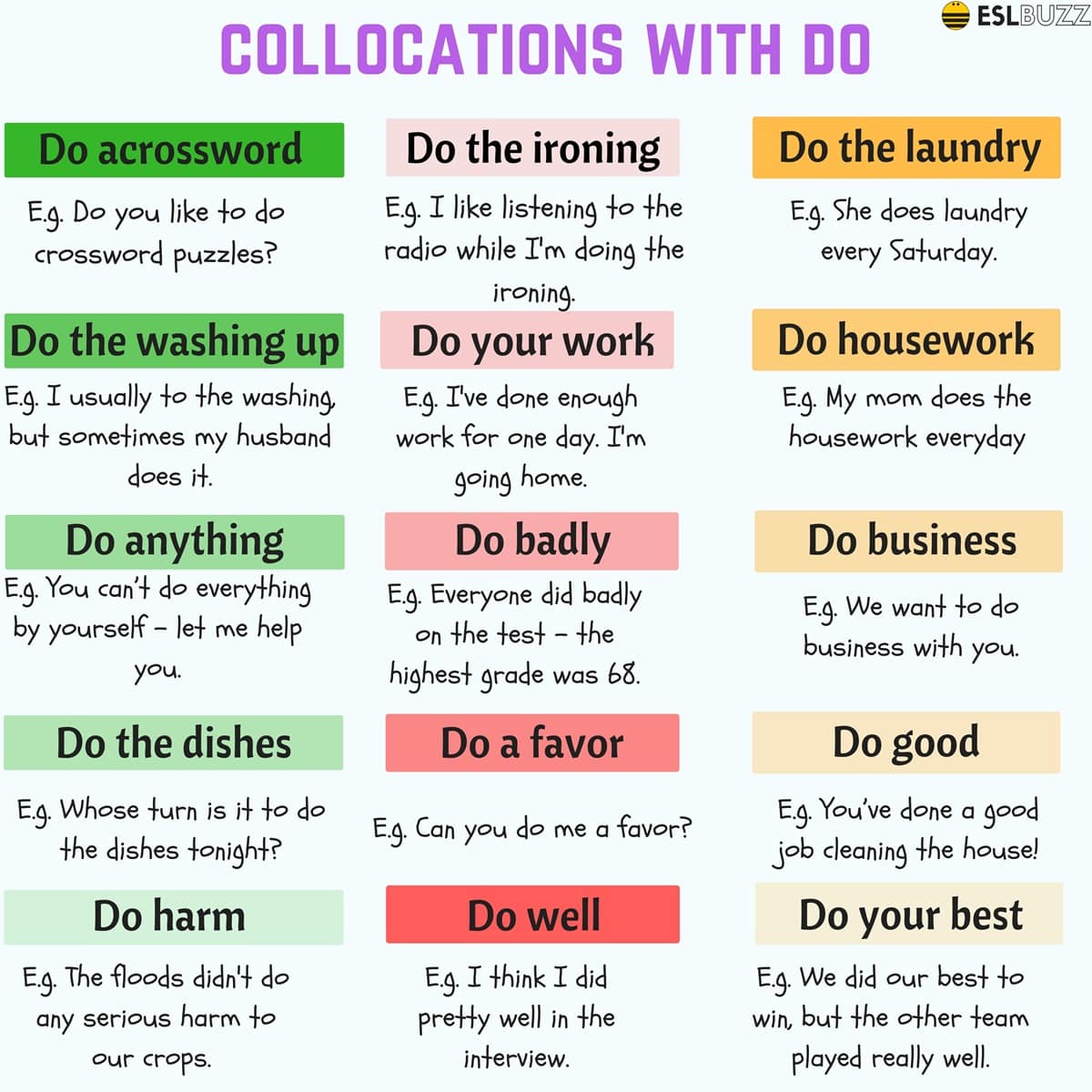
Verb Collocations in English | Pictures
Common Verb Collocations
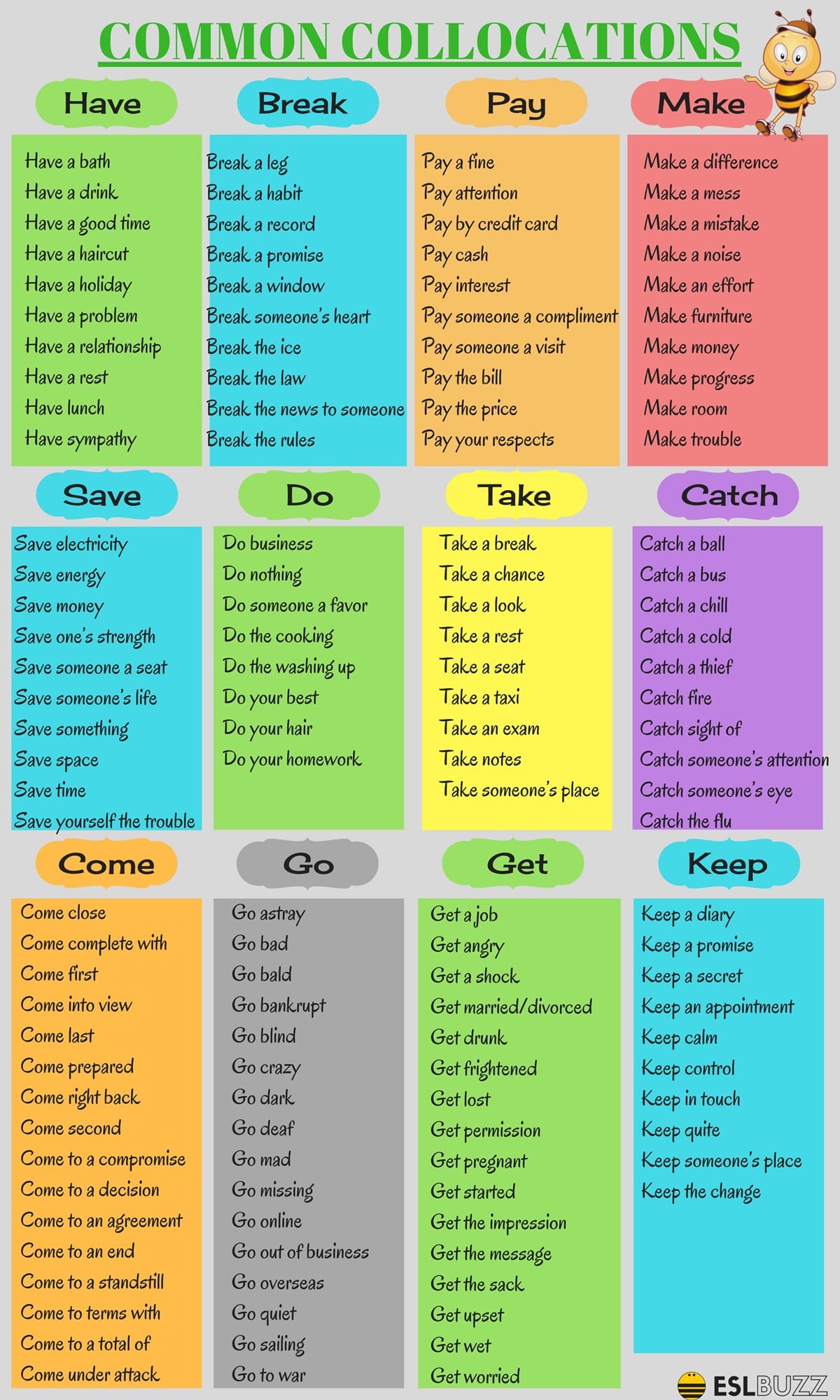
Related Posts
![Learn English with Music Video [Katy Perry – Rise] Learn English with Music Video [Katy Perry – Rise]](https://www.fluentland.com/wp-content/uploads/2016/12/sfsdfa.jpg)
Learn English with Music Video [Katy Perry – Rise]
![English Listening Practice with Songs [I’m In Love – Alexander Rybak] English Listening Practice with Songs [I’m In Love – Alexander Rybak]](https://www.fluentland.com/wp-content/uploads/2016/12/Alexander-Rybak.jpg)
English Listening Practice with Songs [I’m In Love – Alexander Rybak]
![Learn English with Music [Eminem – Love The Way You Lie ft. Rihanna] Learn English with Music [Eminem – Love The Way You Lie ft. Rihanna]](https://www.fluentland.com/wp-content/uploads/2017/06/sdfa.jpg)
Learn English with Music [Eminem – Love The Way You Lie ft. Rihanna]
- Cambridge Dictionary +Plus
Collocations with verb
These are words often used in combination with verb .
Click on a collocation to see more examples of it.

Word of the Day
Your browser doesn't support HTML5 audio
to change a document in order to deceive people

Sitting on the fence (Newspaper idioms)

Learn more with +Plus
- Recent and Recommended {{#preferredDictionaries}} {{name}} {{/preferredDictionaries}}
- Definitions Clear explanations of natural written and spoken English English Learner’s Dictionary Essential British English Essential American English
- Grammar and thesaurus Usage explanations of natural written and spoken English Grammar Thesaurus
- Pronunciation British and American pronunciations with audio English Pronunciation
- English–Chinese (Simplified) Chinese (Simplified)–English
- English–Chinese (Traditional) Chinese (Traditional)–English
- English–Dutch Dutch–English
- English–French French–English
- English–German German–English
- English–Indonesian Indonesian–English
- English–Italian Italian–English
- English–Japanese Japanese–English
- English–Norwegian Norwegian–English
- English–Polish Polish–English
- English–Portuguese Portuguese–English
- English–Spanish Spanish–English
- English–Swedish Swedish–English
- Dictionary +Plus Word Lists
{{message}}
There was a problem sending your report.

IMAGES
VIDEO
COMMENTS
Words often used with visit in an English sentence: annual visit, brief visit, courtesy visit, emergency visit, follow-up visit, frequent…
a [week, two-week, weekend] visit; pay my [sister, dad, friend] a visit; pay a visit to my [sister] was on a visit to the [USA, university] is away on a visit to; had to [extend, cut short] their visit; enjoy your visit; a visit to the [doctor, dentist, his grandparents] a visit from [your parents, a friend] a visit by the [taxman, inspector]
" They visit their parents regularly. " (regularly, often, frequently, occasionally) " We rarely visit our relatives. " (rarely, almost never) " The president personally visited the sick child. " (personally) Used with verbs: " I plan to visit my sister next month. " (plan to, hope to , intend to, want to, wish to) Used with nouns: " We want to ...
Online Collocation Dictionary. A completely new type of dictionary with word collocation that helps students and advanced learners effectively study, write and speak natural-sounding English . This online dictionary is very helpful for the education of the IELTS, TOEFL test. Level: Upper-Intermediate to Advanced.
Definition of visit verb in Oxford Advanced Learner's Dictionary. Meaning, pronunciation, picture, example sentences, grammar, usage notes, synonyms and more. ... Find out which words work together and produce more natural-sounding English with the Oxford Collocations Dictionary app. Try it for free as part of the Oxford Advanced Learner's ...
A collocation is two or more words that often go together. These combinations (for example collocations with "VISIT") just sound "right" to native English speakers, who use them all the time. On the other hand, other combinations of "VISIT" may be unnatural and just sound "wrong". Using collocations list of "VISIT" improves ...
Word family (noun) visit visitor visitation (verb) visit revisit. From Longman Dictionary of Contemporary English Related topics: Tourism vis‧it1 /ˈvɪzɪt/ S2 W1 verb 1 [ intransitive, transitive] to go and spend time in a place or with someone, especially for pleasure or interest Eric went to Seattle to visit his cousins.
The dictionary contains over 150,000 collocations for nearly 9,000 headwords. The dictionary shows words commonly used in combination with each headword: nouns, verbs, adjectives, adverbs, and prepositions, common phrases. The collocation dictionary is based on 100 million word British National Corpus.
English collocations and co-occurrences for 'visit' : Which words (nouns, verbs, adjectives) are characteristic in the neighbourhood of 'visit'? FluentWords. Collocations; Conjugation; Sentence Generator; Translator; Dictionary; Idioms; Diacritizator; Collocations. Find typical usage patterns (collocations) for English words. Enter a verb, a ...
3 [intransitive, transitive] to stay somewhere for a short time We don't live here. We're just visiting. visit something The lake is also visited by seals in the summer. 4 [transitive] visit something to make an official visit to someone, for example to perform checks or give advice government inspectors visiting schools; Phrasal Verbs visit on visit with. See visit in the Oxford Advanced ...
Collocations in Conclusion. A collocation is a pair or more of words that go together. It is composed of different patterns, such as verb + adverb, noun + noun, and verb + noun. Try to recognize a collocation as soon as you read or hear one. Write it down, find the definition, and use it in a sentence.
VISIT definition: 1. to go to a place in order to look at it, or to a person in order to spend time with them: 2. to…. Learn more.
Examples of collocations with have in English. Have a bath. Have a drink. Have a good time. Have a haircut. Have a holiday. Have a problem. Have a relationship. Have a rest.
14 meanings: 1. to go or come to see (a person, place, etc) 2. to stay with (someone) as a guest 3. to go or come to (an.... Click for more definitions.
an occasion or a period of time when somebody goes to see a place or person and spends time there. a two-day/three-day visit; the prime minister's surprise visit to the troops; an official/state visit; visit to somebody/something It's my first visit to New York.; If you have time, pay a visit to the local museum. The family made a visit to England in the summer of 1923.
️ Boost your English with Phrasal Verbs! pay a visit. This page is about the collocation pay a visit. collocation pattern: verb + noun. Meaning. to visit someone or something. For example. You should pay your lawyer a visit and get some advice. If you have time, pay a visit to the science museum while you're here.
Get a joke; E.g: Not everyone got the joke, but those who did laughed. Get a letter (receive) E.g: I got a letter from my friend in Nigeria. Get a shock; E.g: I got a shock when I saw my phone bill. Get a splitting headache; E.g: His lack of knowledge of health always makes him get a splitting headache. Get a tan; E.g: I used to be much amused by sitting on the beach, getting a tan and hearing ...
The verbs "have," "take," and "make" are worth a special mention because they have lots of common collocations: have. have a baby, have breakfast, have fun, have a headache, have an illness, have a good time; take. take advice, take a bath, take medicine, take a picture, take a shower, take your time; make
VISIT meaning: 1. to go to a place in order to look at it, or to a person in order to spend time with them: 2. to…. Learn more.
Verb Collocations. Tanya Trusler October 25, 2018. Collocations are words that naturally go together in a language. While native English speakers instinctively know that "fast food" sounds right but "quick food" does not, English learners may not be able to recognize why some words work well together while others with a similar meaning ...
Sophie March 21, 2018 Editor Picks, English, Speaking Lessons, Vocabulary No Comments. Verb Collocations! In the English language, collocation refers to a natural combination of words that are closely affiliated with each other. Some examples of verb collocations are "pay attention", "fast food", "make an effort", and "powerful ...
Words often used with verb in an English sentence: active verb, causative verb, intransitive verb, mental verb, plural verb, singular verb…
check in on, look in on, comfort Collocations, attend Collocations, bring comfort to, bring cheer to, nurse Collocations, minister to, call in on, be called out to Sense: Verb: afflict - literary Synonyms: